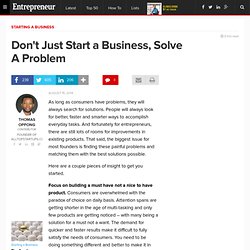

Biz Stone to Aspiring Entrepreneurs: If You're Not Emotionally Invested, Don't Do It. Internet entrepreneur, Twitter co-founder and Jelly Industries co-founder and CEO Biz Stone has spent his career building innovative businesses that aim to influence how we communicate -- everything from microblogging to podcasting and Q&As.

For Stone, who worked at Google early in his career and got his start in art and design, his most rewarding ventures have all had the same thing in common: emotional investment. "Success isn't guaranteed with emotional investment, but failure pretty much is if you don't. " In 2013, Stone and Ben Finkel launched Jelly Industries with the intent to rethink how we search. Users of the mobile-app Jelly could ask and answer questions with not just text but by using their location, photos and interactive maps.
Related: Biz Stone: Good Works Can Shape Your Company's Mission and Market Recently, Jelly Industries took their learnings from Jelly and launched an app called SUPER! Related: Creating The Right Culture For Startup Success. 9 Habits of High-Performing Business Leaders. There’s more than one way to run a business and become a successful entrepreneur.

Yet many of the most seasoned business leaders share similar habits in their approach to life and work. Here are nine secrets these professionals use to master their craft, grow their businesses and achieve extraordinary success. Related: The Most Important 20 Minutes of the Day 1. Plan for the long term. In a competitive market, the temptation to prioritize short-term goals is difficult to ignore. But if you focus only on the short term, your business may not reach its full potential. 2. Respond to emails, phone calls and other requests immediately. 3. Entrepreneurs often face hard decisions about resource allocation. Always consider the return on an investment when you evaluate the best ways to spend company funds.
Don't Just Start a Business, Solve A Problem. As long as consumers have problems, they will always search for solutions.

People will always look for better, faster and smarter ways to accomplish everyday tasks. And fortunately for entrepreneurs, there are still lots of rooms for improvements in existing products. That said, the biggest issue for most founders is finding these painful problems and matching them with the best solutions possible. Here are a couple pieces of insight to get you started. Focus on building a must have not a nice to have product. Related: Creative Problem-Solving Strategies to Test Your Business Idea Solve real painful problems. Related: Want to Solve Problems More Efficiently? What is the one painful problem you can solve without struggle? Your business should be your passion. You will need all the inspiration, commitment and the perseverance you can get to make it as an entrepreneur, hence the need to start a business you are passionate about.
Coupled with passion, is the ability to execute. 5 Essential Skills of an Entrepreneur. 9 Daily Habits That Will Make You Happier. Happiness is the only true measure of personal success.

Making other people happy is the highest expression of success, but it's almost impossible to make others happy if you're not happy yourself. With that in mind, here are nine small changes that you can make to your daily routine that, if you're like most people, will immediately increase the amount of happiness in your life: 1. Start each day with expectation. If there's any big truth about life, it's that it usually lives up to (or down to) your expectations. 2. The most common source of stress is the perception that you've got too much work to do. 3. I'm not talking about a formal, wrapped-up present. 4. Arguments about politics and religion never have a "right" answer but they definitely get people all riled up over things they can't control. 5. Since you can't read minds, you don't really know the "why" behind the "what" that people do. 6.
Sometimes we can't avoid scarfing something quick to keep us up and running.